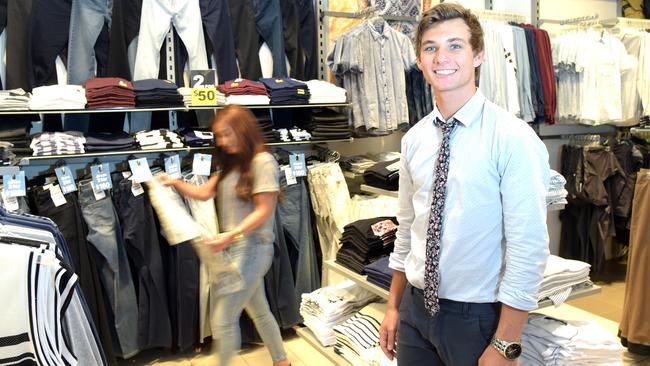Roger David’s collapse reflects the demise of the suit and tie
Once “casual Fridays” took hold, and strict office dress codes disappeared, menswear chain Roger David didn’t stand a chance.

Indeed there is plenty of blame to go around when searching for reasons for the demise of Australia’s third largest menswear chain, Roger David.
There are also landlords who demand exorbitant rents that would squeeze even the best and most profitable retailers. Then there are the consumers with their penchant for shopping online, or hunting for bargains and promotions.
The collapse into voluntary administration of Roger David after 76 years in business speaks volumes about the slow demise of menswear chains, as well as the ills of the broader fashion sector which, over the last three years, has suffered dozens of high profile-failures.
Retailers such as Topshop, Pumpkin Patch, Payless Shoes, Marcs, David Lawrence, Herringbone, Rhodes & Beckett, Live Clothing and Maggie T are among the many to have hit the wall.
Roger David is the latest and one of the biggest.
After World War II it was the place to shop for a young man looking for a new suit for his first job, or for older gentlemen seeking something smart, sensible and conservative.
Sniffing the wind, and looking to break out from just selling suits, Roger David in the late 1980s began making room in its stores for casual wear. To the shock of its rusted-on, older customers this even included jeans and T-shirts, as the tradition of good suits at reasonable prices was cast aside.
Where once customers would be greeted by an older gentleman with a tape measure hanging around his neck and dressed in an immaculate suit and tie, Roger David staff became younger and hipper. There were no tape measures to be seen.
Some Roger David stores in the 1980s even had men’s barbers in the corner, where a customer could have a short back and sides, chat to the hairdresser and then pick up a paisley tie or grey suit.
Goodbye Roger David. https://t.co/uiV58lmGXO remembering better times, my Dad at his Roger David store in Frankston (note the hairdresser pole in the corner, the days when menswear stores had an in-store barber) pic.twitter.com/2QNuekyX0N
— Eli Greenblat (@EliGreenblat) October 18, 2018
In part its shift to casual fashion made sense. Young men just aren’t buying suits like their fathers or grandfathers.
Of if they are, they are increasingly going online or to cheap discounters with which stores like Roger David or Fletcher Jones (which collapsed years ago) could not compete.
Roger David’s attempted change in strategy never really worked. With fast fashion chains such as Zara, H&M and Japanese department store Uniqlo muscling in, stores like Roger David looked old, off-trend and behind the pace.
It doesn’t help when shopping centre landlords claw in massive rents and refuse to cut them in the face of declining shopping traffic and the move to online shopping.
As long-time ragtrader Solomon Lew warned, unless mall landlords reduced their rents to reflect the new realities of shopping, then he would take his fashion stores elsewhere.
And Mr Lew’s fashion investment vehicle Premier Investments has done exactly that, recently walking away from its Portmans and Just Jeans flagship stores in Melbourne’s Bourke Street mall when a deal on lower rents couldn’t be reached.
Mr Lew’s other chains also quit sites if they could not secure lower rents, and others have followed.
But while rents can be negotiated, fashion retailers can’t escape higher costs such as utilities and staff wages. And although real wages have remained flat, energy bills are skyrocketing and it is almost impossible to pass this on to customers in the form of higher prices when all stores are discounting or running promotions.

But ultimately, for menswear, it’s mostly the growth of casual clothing in the workplace.
In many offices wearing a suit to work, including a tie, is now regarded as old-fashioned.
Anyone who does turn up dressed like this is immediately assumed to be preparing for a job interview.
Younger men just don’t feel the need or pressure to wear a suit.
Skinny jeans and some nice sneakers seem to be acceptable.
Roger David never stood a chance.
* Journalist Eli Greenblat’s father Sol ran a Roger David store in Frankston in the 1980s.





You could blame the creeping, insidious nature of “casual Fridays”. Millennials, too, need to be made accountable, with their indifference to dress codes that once demanded a suit and tie at work.